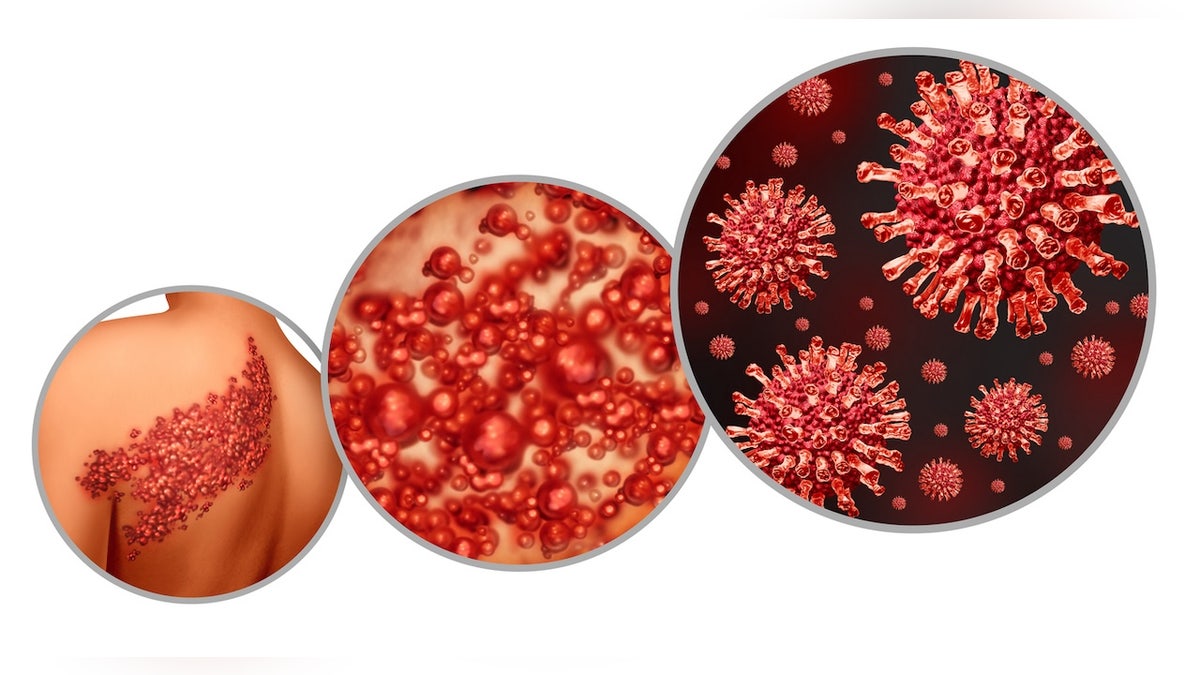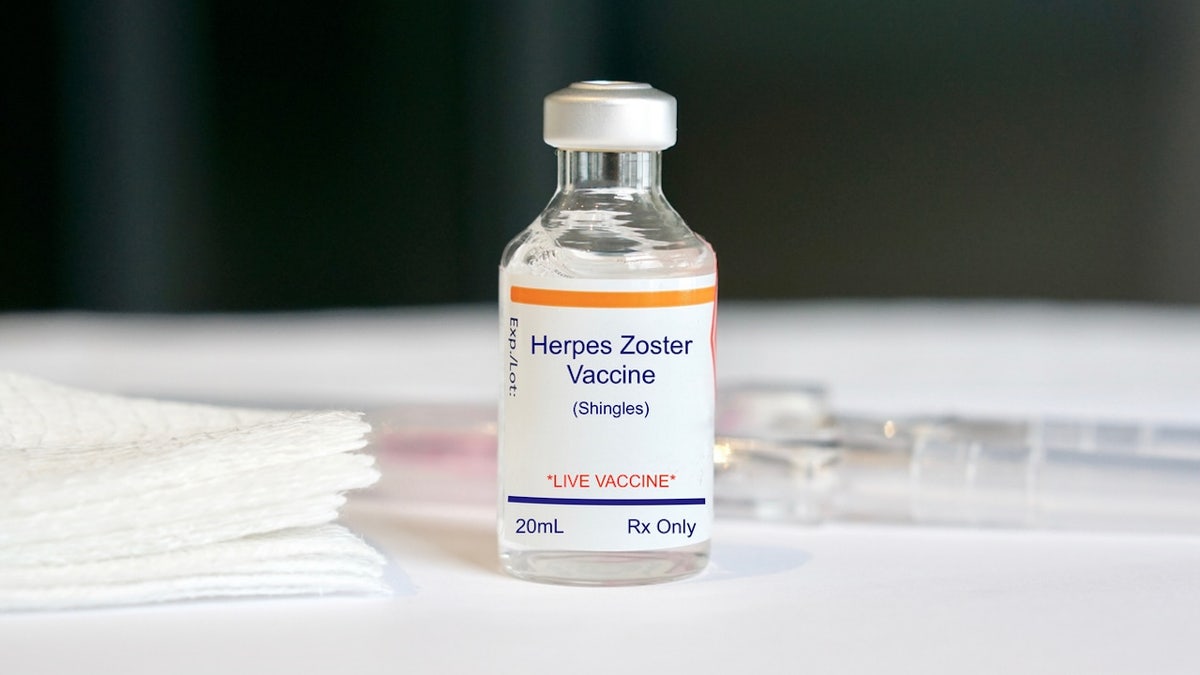A new study finds that a single shingles infection may increase the risk of confusion and long-term memory loss.
The study, conducted by Brigham and Women's Hospital and Harvard Medical School, linked the virus to increased risks of “subjective cognitive decline,” according to a Harvard news release.
The results were published in the journal Alzheimer's Research & Therapy on August 14.
WHAT YOU NEED TO KNOW ABOUT VIRUS RASH
“Subjective cognitive decline” captures the earliest cognitive changes that are noticed before evidence of cognitive impairment appears on standard neuropsychological tests, explained study author Sharon Curhan, MD, a physician and epidemiologist at Brigham and Women’s Hospital in Boston.
It was also associated with a higher risk of mild cognitive impairment (MCI) and dementia.

A new study finds that a single shingles infection may increase the risk of confusion and long-term memory loss. (iStock)
“Shingles may contribute to dementia risk through neuroinflammation, damage to brain blood vessels (cerebral vasculopathy), or direct neuronal damage,” Curhan told Fox News Digital.
In this particular study, researchers analyzed data from three large cohorts of more than 150,000 women and men over a 13-year period.
The data come from the Nurses' Health Study, the Nurses' Health Study II and the Health Professionals Follow-up Study, according to Curhan.
“We were surprised by the magnitude and duration of the increased risk.”
“It has been suggested that the magnitude of the increased risk may be greater in people who have not been vaccinated against shingles,” she said.
Researchers determined that shingles was associated with a 20% higher long-term risk of subjective cognitive decline.
ADULT VACCINES COULD REDUCE RISK OF ALZHEIMER'S IN OLDER PEOPLE, STUDY SAY: 'ENHANCED IMMUNE RESPONSE'
“We were surprised by the magnitude and long duration of the increased risk, and [the fact] “It may be different in women and men,” Curhan told Fox News Digital.
The increased risk was even higher in people who were genetic carriers of APOE e4 — the gene that increases the risk of Alzheimer's disease — than in men who were not APOE e4 carriers, she noted, but that was not the case in women.

Medically known as herpes zoster, shingles is a painful, blistering skin rash caused by the varicella-zoster virus (VZV), the same virus that causes chickenpox. (iStock)
Although he stressed that this was an observational study and did not prove a cause-and-effect relationship, Dr. Marc Siegel, a senior medical analyst for Fox News, said he believed “the observation was real.”
“Shingles is a reactivation of a virus that was hiding in the nerves,” he told Fox News Digital. “It causes inflammation, and when inflammation affects the brain, it’s associated with cognitive decline, which can lead to Alzheimer’s disease.”
LINK BETWEEN DEMENTIA AND DEPRESSION: STUDY REVEALS EARLY SADNESS CAN LEAD TO LATER COGNITIVE PROBLEMS
Previous studies have also looked at the association of shingles and other viruses with Alzheimer's disease and other diseases that cause dementia, according to Heather M. Snyder, PhD, senior vice president of medical and scientific operations at the Alzheimer's Association of Chicago.
“It’s not known whether the virus is present in individuals because of changes associated with diseases that cause cognitive decline, changes in the immune system or some kind of cause and effect,” Snyder, who was not involved in the study, told Fox News Digital.
“When inflammation affects the brain, it is associated with cognitive decline.”
Previous research has also shown that a history of shingles is also associated with a higher long-term risk of a major cardiovascular event, such as a stroke or heart attack, which could last for many years after infection, Curhan cautioned.
What you need to know about shingles
Shingles, known medically as herpes zoster, is a painful, blistering skin rash caused by the varicella-zoster virus (VZV), which is the same virus that causes chickenpox, according to the U.S. Centers for Disease Control and Prevention (CDC).
The rash and blisters usually turn to scabs after seven to ten days.
The infection is common, affecting about one in three people in the United States during their lifetime.

In addition to the rash, which usually appears as a stripe on one side of the body or face, symptoms may include fever, chills, headache, and stomach upset. (iStock)
“The majority of adults have shingles lurking in their brain cells, from a previous infection at an earlier point in their life,” Snyder said.
In addition to the rash, which usually appears as a stripe on one side of the body or face, symptoms can include fever, chills, headache and stomach upset, according to the CDC.
In some cases (10-18%), the virus can cause complications such as long-term nerve pain.
In the United States, one in three people will develop shingles in their lifetime.
Other rare but serious side effects may include vision loss, bacterial infections, pneumonia, brain inflammation (encephalitis), hearing loss and death, according to the CDC.
These complications are more likely to affect people with weakened immune systems.
Antiviral treatments and pain relievers are available for people with this disease.
Means of prevention
These findings show the “long-term implications” of shingles and underscore the importance of public health efforts to prevent infection, Curhan noted.
According to the CDC, the vaccine was found to be 90% effective in preventing infection and long-term nerve pain in adults 50 and older who have healthy immune systems.

According to the CDC, vaccination against shingles has been shown to be 90% effective in preventing infection and long-term nerve pain in adults 50 and older who have healthy immune systems. (iStock)
“Given the increasing number of Americans at risk for this painful and often debilitating disease and the availability of an effective vaccine, shingles vaccination may provide a valuable opportunity to reduce the burden of subsequent health problems due to shingles, such as chronic pain (postherpetic neuralgia), cardiovascular complications, or cognitive decline and dementia,” Curhan said.
The CDC recommends routine shingles vaccination for people ages 50 and older, whether they have had a previous episode of shingles or received a vaccine before.
CDC recommends additional COVID-19 vaccine for adults 65 and older
“Anyone who may be eligible for the vaccine or has questions or concerns about vaccination should consult a health care professional,” Curhan said.
Siegel echoed the merits of vaccination.
CLICK HERE TO GET THE FOX NEWS APP
“This study adds to the growing body of evidence that the shingles vaccine (Shingrix) is important for all people over 50 years of age (who have had chickenpox or the chickenpox vaccine) to reduce the risk of reactivation of the shingles virus and/or complications of active infection,” he said.
Potential limitations
This was an observational study that focused primarily on a white, highly educated population, Curhan noted — meaning future studies in other populations could strengthen the research.
“In addition, we did not have information on the vaccination status of the entire study population, so we were only able to examine this relationship within a subset,” she added.

“Most adults have shingles lurking in their brain cells, from a previous infection at an earlier point in their life,” one doctor said. (iStock)
Much of the study period took place before the shingles vaccine was widely available, Curhan said — and even once it was introduced, uptake was generally low.
The most recent vaccine was not available before the study ended.
CLICK HERE TO SUBSCRIBE TO OUR HEALTH NEWSLETTER
“As uptake of the new shingles vaccine increases, additional studies evaluating whether vaccination status influences the relationship between shingles and risk of cognitive decline would be informative,” Curhan said.
For more health articles, visit www.foxnews.com/health
“So we are currently collecting this information from our participants and hope to conduct these studies in the future.”
